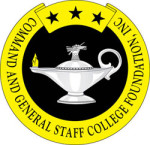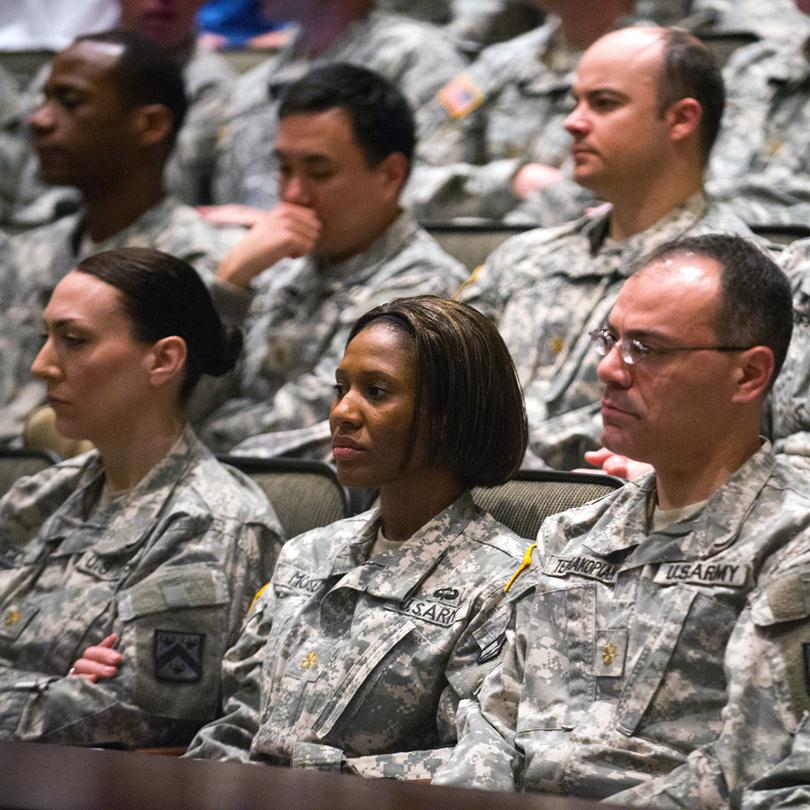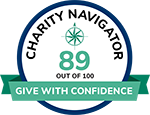by Dr. Michelle A. Miller, Mr. James Pennington, and Mr. Billy D. Miller, Jr.

Students at the U.S. Army Command and General Staff College attend a lecture in Eisenhower auditorium. (Photo courtesy of the U.S. Army.)
As part of the Army University, the U.S. Army Command and General Staff College (CGSC) is constantly learning and evolving. This evolution of change is vital to the mission of the college in educating, training and developing leaders in a learner-centric environment. Most like other universities, the Command and General Staff Officer’s Course (CGSOC) continuously looks for new ways to increase the “academic rigor” of the courseware while using the very latest technologies. Academic rigor in a learner-centric environment allows our students the freedom to create, integrate, and apply their own meaning to the doctrine, mental models, skills, and processes taught at here the college. Part of this recent change involves the implementation of the first Common Core Comprehensive Exam (Comp Exam) to the CGSOC Classes of 2017, 2018, and 2019, yearly comprised of approximately 1,200 students, adding rigor to the courseware and raising the academic bar.
Raising the Bar
Since its inception in 1881, the college has persistently raised the academic bar to keep up with the educational and operational demands of the ever-growing United States Army and the Department of Defense. As part of a latest curriculum redesign, CGSC students now complete both an Online and an Oral Board Comprehensive Exam. The Comp Exam has proven to be an enormous success; in its educational value and the technological step forward for CGSC and Training and Doctrine Command. The Comp Exam has substantiated itself to be a very important event for CGSC mainly for two reasons. First, even though it is a first time Comprehensive Exam, the faculty performed the event in a most professional manner, providing assessment and results that are clearly on par with other higher learning educational institution expectations. And, secondly, current Blackboard technology supports the extreme load of over 1,200 simultaneous users without any type of degradation of service.
Comprehensive Exam
Many graduate level programs require a comprehensive examination to evaluate a student’s mastery of the curriculum. CGSOC’s Comp Exam is a summative assessment evaluating our students’ learning at the end of the common core curriculum. No small feat, this multi-purpose exam equitably and accurately measures our student’s cumulative knowledge, encourages long-term retention of the course material, and assesses our student’s ability to critically think by integrating and synthesizing the materiel that we teach. But most importantly, the Comp Exam assesses our student’s ability to effectively communicate, thereby achieving the expected overall outcomes of our graduates.
Exam Composition
The Comp Exam, most commonly referred to as “X100” consists of two components – an online exam and an oral board. The online exam is an objective test administered via Blackboard, consisting of 50 knowledge and comprehension-level questions. These questions are prerequisites of what every graduate needs to know. The oral board is a grueling one-hour individual session conducted by a panel of three skilled faculty members. The oral faculty board uses four integrated questions to assess the student’s mastery of the core materiel. Student responses must represent a deep and integrated synthesis of knowledge from our core curriculum. As well, student responses must be comprised of a well-structured and logical argument with relevant and accurate evidence to support their declared position. Summative in nature, the Comp Exam is a graded event resulting in a Transcript Recordable Item worth one credit hour. The online exam provides 30 percent of the final grade with the oral board providing the additional 70 percent of the final comp grade. The oral board is weighted more heavily because of the focus on synthesis and integration of our core lessons.
Growth of Students, Faculty, Staff, and Technology
The implementation of the Comp Exam has a multi-prong approach of evolving both the students and faculty population as well as a growth in the use of Blackboard technology. A faculty working group, representative of all the college departments, diligently developed the overall program, the examination questions, and a plethora of appropriate assessment tools. The faculty and staff participated in a development program, led by team of dynamic, hand-selected faculty members. The Comp Exam was originally recommended and developed to increase both the rigor and relevancy of the curriculum and keep abreast with the latest technology in the classroom but the effects of the exam have been far-reaching. Our students are strongly encouraged to develop study groups for collaborative learning, helping to transcend the confines of the classroom walls. Ultimately, the Comp Exam supports active and collaborative learning techniques and encourages an open dialog of our student’s vast experiences.
One of the greatest benefits of the new program is evidenced by an intellectual growth; both of our students and our faculty. Outstanding leadership was a driving factor in the paradigm shift to a summative assessment. CGSC Academic Directors, Col. Robert T. Ault and his predecessor Col. Douglas C. Cardinale provided oversight to Working Groups consisting of members from each department in the initial design and development of the program. First initiated in December 2016, the design, resourcing, and scheduling rapidly occurred with a near perfect execution in November 2017. During the busy 11 months, the Working Group met weekly to ensure a successful execution, which included publishing a Lesson Plan for faculty, an Advance Sheet for students, a mock panel training video, and detailed grading rubrics built and deployed using the latest Blackboard technologies. The Working Group demonstrated a mastery of the Military Decision Making Process in the development and planning of the event, exploring every possibility and every possible Course of Action. An extremely professional and seasoned faculty established mock panels, rehearsed, and studied to ensure they were prepared and ready for the Oral Board assessment. In days preceding the Comp Exam, key members of the Working Group personally monitored the build and adaptive release of the Blackboard exam and assisted the Blackboard Help Desk during the actual online exam to deter any last minute issues.
Based on the Comp Exam, the use of Blackboard technology has increased exponentially at the college. The commercially hosted Blackboard Learn (e-Learning system used by CGSC) was highly instrumental in the successful execution of the online exam. In the four years CGSC has used commercially hosted Blackboard, the stability of the system has been incredible with a 100% reliability rate. The online exam proved to be a larger test of the system than the Army Learning Management System executed for the Army the Limited User Test in 2004, unfortunately, the Limited User Test was not completely successful. However, the Comp Exam proved to be a complete success with almost 1,200 students completing the exam in the allotted time each year. This powerful combination of student, faculty, and technology resulted in the development of student leaders who are inspired to learn, adapt, achieve, and be an integral part of a collaborative team.
End State
This evolution of change is vital to the mission of the college in educating, training and developing leaders in the learner-centric environment of Army University. As CGSC learns new ways to increase academic rigor, the application of the Comp Exam has proven itself to be our best way forward. The institution of the Comp Exam not only enhances academic rigor in a learner-centric environment using the latest Blackboard technology; but it allows our student’s the freedom to create, integrate, and apply meaning to doctrine, mental models, skills, and processes we teach here at CGSC. Most importantly, the Comp Exam increases the overall rigor of the college and clearly raises the academic bar yet another notch at the Command and General Staff College.
Author Bios
Michelle A. Miller, Ph.D., serves as an Associate Professor at the U.S. Army Command and General Staff College, Army University, and the Combined Arms Center, Fort Leavenworth, Kansas. A Lieutenant Colonel (retired) from the U.S. Army, Miller served 24 years as a Signal Officer. Dr. Miller is currently assigned as the Course Author for the X100 Comprehensive Examination, her areas of interest, study, and research involve assessments, tactics, academic advising, coaching and mentoring.
James (Jake) Pennington serves as the Manager of the Army University Lifelong Learning Center at the U.S. Army Command and General Staff College, Fort Leavenworth, Kansas. A Major (retired) from the U.S. Army, Pennington served 20 years as an Army soldier and officer. His areas of interest, study, and research involve learning and mobile technologies.
Billy D. Miller, Jr., serves as an Assistant Professor of Leadership at the U.S. Army Command and General Staff College, Army University, and the Combined Arms Center, Fort Leavenworth, Kansas. A Lieutenant Colonel (retired) from the U.S. Army, Miller served 24 years as a Signal Officer. His areas of interest, study, and research involve leadership, organizational change, coaching and mentoring.

Simply enter your email address below and click the subscribe button...
We 100% respect your privacy













Looking forward to seeing the progress!
Pingback: Blackboard Csgc - BlackboardHub.Com
Pingback: Cgsoc Blackboard - BlackboardSub